From Struggling Student to Successful Teacher: My Journey with Executive Functioning Challenges

I was a backpack stuffer.
All the papers I received during the day were crumpled and stuffed at the bottom of my backpack, crushed by the weight of objects I didn’t need. I couldn’t find anything. Homework assignments were turned in late or not at all. Permission slips never made it to my parents. And I would rather not discuss what happened to my lunch.
I failed every binder test. I didn’t know how to put papers in my binder or manage my time. I couldn’t break down long-term projects into manageable chunks. I struggled. All of this conspired to tank my self-esteem. I wanted to do well in school but didn’t know how.
Does this sound familiar to anyone?
Looking back, I now know I needed help with executive functioning.
Executive functioning is managing time, focusing attention, remembering instructions, prioritizing, and completing multiple tasks. This applies to school, home, and life. It is needed to do well in school and at a job, as well as to maintain relationships.
Strategies That Help With Executive Functioning
Make Schedules Visible
One of my struggles was with time. Time seemed to pass too fast or too slow. Due dates snuck up from nowhere, causing me to scramble to finish larger assignments. I was the kid who asked her mom to take her to the library at 8 pm the day before the assignment was due. Eventually, I learned the strategy of using a calendar. Well, my mom taught me the strategy of using a calendar. It started with her demonstrating how to use it, and eventually, I started to do the task on my own. I had two large dry-erase calendars above my desk with all my due dates and events color-coded. This helped me see what was coming up, so I wasn’t blindsided by a due date.

The large dry-erase calendars also helped me break down assignments into manageable chunks. When I received a large project, I became completely overwhelmed. Where do I start? What are the steps? I was paralyized. Now, I could use the calendars to plan how and when I would study, and what parts of a project I wanted to complete.
Use Folders Instead of Binders
I couldn’t handle using a binder for several reasons. I didn’t know how to use tabs. This might sound simple, but the act of finding the right tab for the right class was difficult. My papers were consistently ripping out. I frequently put papers in the wrong section altogether, leading to lost work and lower grades. Eventually, I came up with the solution of using color-coded folders. I had a folder and a spiral notebook that were the same color for each class. This helped me keep track of my possessions, as well as help manage block scheduling. I needed a concrete visual way to manage my things.
Create Routines
When I came home, I would leave a trail of my belongings throughout the house. I couldn’t find my possessions, so I couldn’t even begin to do my homework or projects. Like many others who struggle with executive functioning, I need routines. I need to do things the same way every day and have a place to put everything. I started small because creating routines for everything all at once was incredibly overwhelming. The first routine was putting my belongings in my room right after school. This included my backpack, coat, and shoes. The next routine was around homework. I emptied my backpack, put my work in my study area, and wrote my homework on my dry-erase board.
Set Up a Study Area
My room was my oasis. It was filled with things I enjoyed, and I often got lost in it for hours. This was not helpful when I needed to finish homework. Studying in my room did not work; I needed to find a separate place to buckle down. I began working at the dining room table. I would sit there and work on assignments every day after I had a snack. It was a space for work and not play.
Timers, Timers, Timers
I couldn’t gauge how much time a particular assignment would take and frequently underestimated the amount of time needed for an assignment, so I had to rush to get it done. Or I would overestimate how much time an assignment would take, so I would become overwhelmed. So, I tried setting a timer before I started a task or a chore. I found that often I would overestimate how long it would take to complete a task like vacuuming. In my mind I thought it would take hours when, in reality, it took 15 minutes. I would set a timer for 10 or 15 minutes and try to do as much as possible during that time. This strategy created a sense of urgency, which I needed in order to start a task, and helped me better gauge how long a task would take. This taught me that many tasks could be done quickly, which helped me dread them less.
Inject Fun into Otherwise Boring Tasks
There is nothing more boring than reading a textbook. When reading, I struggled to focus, and I often answered the comprehension questions using the knowledge I already knew rather than learning new material. But, I was always good at daydreaming and had a rich inner life. One strategy I used was to apply my imagination to my boring tasks. I read my textbooks in the voice of Morgan Freeman. I don’t know about you, but I can listen to him talk all day. This helped me pay attention because I wasn’t only reading, I was imagining.
When it came to chores, I also struggled with remembering to do them and motivating myself to complete them. Another strategy I used, and still use, was pretending that the world would be destroyed if I didn’t complete a chore quickly. I was a spy in charge of saving the world. I know this sounds like an extreme scenario, but it motivated me and still motivates me. It’s also fun.
Celebrate the Positive
It’s easy to get bogged down by the mistakes you make. Because I struggled with executive functioning, I thought I was always making mistakes. It made me feel unsuccessful. It made me hate school. My parents asked what was the best part of the day or what I did that was fun helped me see what I did right instead of focusing on what I did wrong.
As an adult, I have largely incorporated these support strategies into my daily life. At TSS, we support executive functioning skills through:
- Clear and consistent routines and procedures that are in common across classes
- Posting a daily class schedule with times next to activities
- Classrooms that are organized and uncluttered
- Teachers give directions, assignments, and schedules both verbally and in written format
- Long-term projects are broken into smaller parts with benchmark deadlines
- Long-term projects are broken into smaller parts with benchmark deadlines
- Timers to help students sustain periods of focused attention, to help with pacing, and to prepare students for transitions
These are just a few of the many ways TSS supports students with executive skills development. Learn more in our post “Executive Functioning Struggles In Students.”
Posted in:

